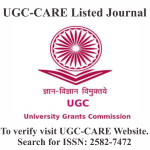INFORMATION LITERACY IN THE ERA OF ARTIFICIAL INTELLIGENCE
DOI:
https://doi.org/10.29121/shodhkosh.v5.i6.2024.4467Keywords:
Information Literacy, Media Literacy, Digital Literacy, Artificial Intelligence, Academic Libraries, ChatGPTAbstract [English]
The concepts of information literacy and digital literacy have been intrinsically linked since the advent of digital information technologies. With the increasing abundance of digital channels, access to information has become more seamless and widespread. The rise of Generative Artificial Intelligence (AI) has further amplified this reality, heightening the need for enhanced information literacy skills, particularly those related to digital environments. As AI continues to influence how individuals access, assess, and generate content, its impact on the meaning and scope of information and media literacy becomes increasingly profound. This study explores the pivotal role of AI-powered research tools in enhancing Information and Communication Technology (ICT) skills and digital literacy among academic professionals and students. Through sophisticated search algorithms, predictive analytics, and automated data processing, AI tools are streamlining the research process, improving both efficiency and precision in academic inquiry. The paper also addresses the ethical challenges posed by AI, such as data privacy, user autonomy, and algorithmic biases. It critically examines recent developments in AI and their potential consequences, particularly in terms of information practices. A central theme of this analysis is how AI’s growing autonomy and adaptability challenge traditional notions of human agency in the information ecosystem.
In addition, the article reviews existing digital literacy frameworks, evaluating their definitions of information and media literacy in light of AI's evolving capabilities. The analysis reveals that these frameworks have been slow to incorporate the rapid advancements in AI technology and the wide-reaching consequences it entails. As academic libraries stand at the forefront of this technological transformation, understanding and leveraging AI’s potential to reshape scholarly discourse and education is essential. This paper aims to guide librarians in navigating the digitalization of information creation, retrieval, and use. Librarians are increasingly called upon to provide clear guidelines for the ethical and effective use of generative AI within their institutions. The implications of AI-driven digital information sources are discussed in the context of librarians' roles, emphasizing the need for proactive leadership in this new digital age.
References
Akakpo, M. G. (2023). Skilled for the future: Information literacy for AI use by University students in Africa and the role of Librarians. Internet Reference Service Quarterly, https:// doing.org/10.10875301.2023.2280566
Chatikobo, M. V. & Pasipamire, N. (2024). Readiness to embrace artificial intelligence in information literacy instruction at a Zimbabwean University. Cogent Education, 11(1). https://doi.org/10.1080/2331186X.2024.2425209 DOI: https://doi.org/10.1080/2331186X.2024.2425209
Chiu,T. K. , Ahmad, Z., Ismailov, M., & Sanusi, I.T. (2024). What are artificial intelligence literacy and competency? A comprehensive framework to support them. Computer and Education open,6,100171. DOI: https://doi.org/10.1016/j.caeo.2024.100171
Colerman, D. E. (2024). Information literacy, information access, and artificial intelligence: a brief overview of their interplay in the modern information world. Journal of hospital librarianship. https://doi.org/10.1080/15323269.2024.2323915 DOI: https://doi.org/10.1080/15323269.2024.2323915
Garingan, D. & Pickard, A. J. (2021). Artificial Intelligence in Legal practical: exploring theoretical Frameworks for algorithmic literacy in the legal information professional. British and Irish Association of law libraries. Doi: 10.1017/S1472669621000190 DOI: https://doi.org/10.1017/S1472669621000190
Ndungu, M. W. (2024). Integrating basic artificial intelligence literacy into media and information literacy programs in higher education: a Framework for librarians and educator. DOI: https://doi.org/10.11645/18.2.641
Saifuddin, S. (n.d). Information literacy for generative AI. retrieved from https://edtechbooks. S3.us-west-2.amazonaws.com
Spencer, J.(2024). Rethinking information literacy in an age of AI. https://spencereducation.com/ai-infoliteracy/
Thrnley, R. & Rosenberg, D. (n.d.). Developing media and information literacy through dialogues about AI. https://spencereducation.com/ai-infoliteracy/
Tiernan, P.et. al. (2023). Information and media literacy in the age of AI: options for the future. Educ. Sci., 13(9). https://doi.org/10.3390/educsc/13090906 DOI: https://doi.org/10.3390/educsci13090906
Wetzel, D. A. & Kani, J. (2024). Enhancing information literacy through generative AI in the library classroom. Pennsylvania library Association, doing 10.5195/palrap.2024.302 DOI: https://doi.org/10.5195/palrap.2024.302
Downloads
Published
How to Cite
Issue
Section
License
Copyright (c) 2024 Sharndip Kaur

This work is licensed under a Creative Commons Attribution 4.0 International License.
With the licence CC-BY, authors retain the copyright, allowing anyone to download, reuse, re-print, modify, distribute, and/or copy their contribution. The work must be properly attributed to its author.
It is not necessary to ask for further permission from the author or journal board.
This journal provides immediate open access to its content on the principle that making research freely available to the public supports a greater global exchange of knowledge.




















